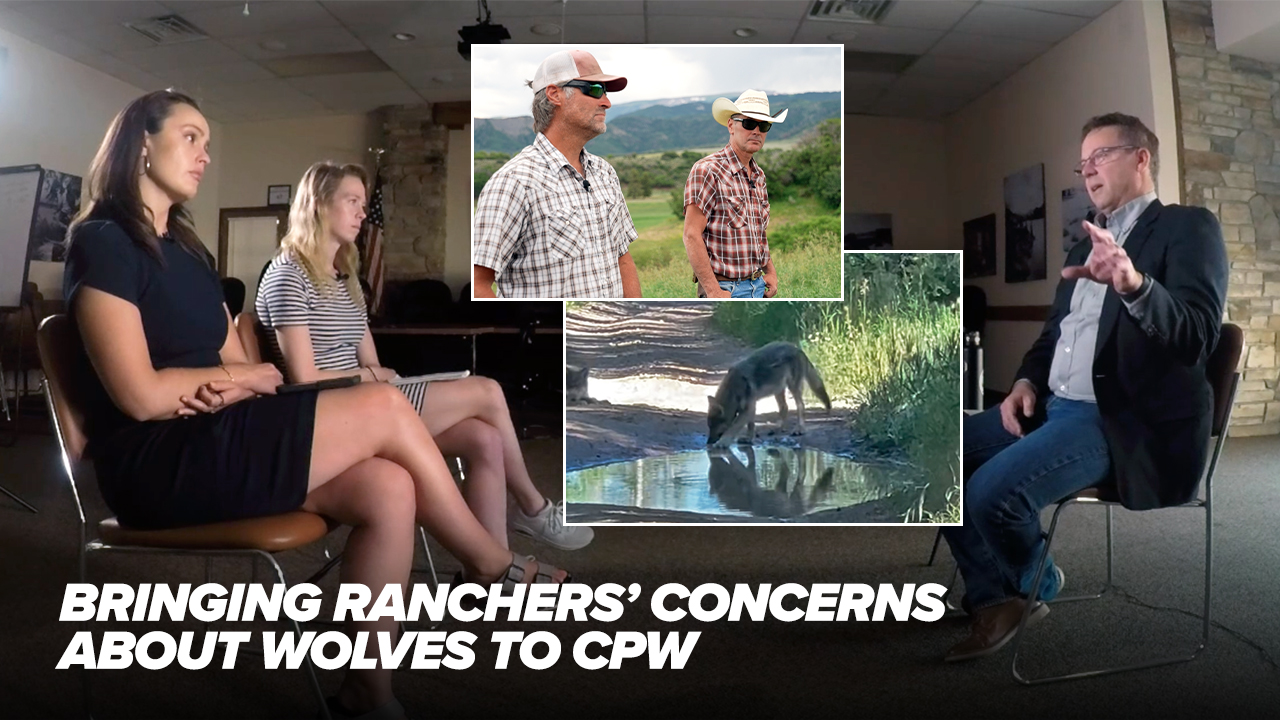DENVER, Colo. — New legislation will aim to pause Colorado's gray wolf reintroduction program and reallocate some of the funds to address health insurance costs through a state program.
The bill reads that in the context of "an emerging budget and health insurance affordability crisis," using taxpayer dollars to reintroduce new wolves is not responsible.
Colorado's General Assembly will meet this week for a special session, as announced by Colorado Gov. Jared Polis on Aug. 6, to address a $1.2 billion loss of revenue. The estimation is that Colorado will hover about $783 million below the TABOR cap this fiscal year.
One of the items lawmakers will review during the special session is Senate Bill 25B-0010, which aims to pause Colorado's gray wolf reintroduction program for the 2025-2026 fiscal year.
If approved, it would decrease the wolf program's budget for fiscal year 2025 from $2,100,000 to $1,835,732, and prohibits CPW from using money from the general fund to reintroduce more gray wolves.
It would, however, permit CPW to continue using the appropriated money to help livestock producers prevent wolf attacks and pay for compensation when one of their animals is seriously injured or killed.
The total reduction amount — $264,268 — would be reallocated to address the affordability of health insurance in the state, the bill reads, by adding the funds to Colorado's Health Insurance Affordability Enterprise.
The move has support from both sides of the aisle. It is sponsored by Sen. Dylan Roberts and Sen. Marc Catlin in the Senate and Rep. Meghan Lukens and Rep. Matthew Martinz in the House.
According to the bill, the estimated cost of the wolf reintroduction program for the state budget year 2023-2024 was $800,000, but ended up totaling $3,457,613.
The bill noted that the funding required for conflict reduction and depredation compensation will likely rise in the coming years.
In November 2020, voters narrowly passed Proposition 114, with voters on the Front Range heavily voting in favor while most counties outside of the metro mostly voted against it.
It mandated that CPW develop a plan and start reintroducing and managing gray wolves in western Colorado by Dec. 31, 2023. Of the 64 counties in Colorado, the majority in 13 voted in support of the wolf reintroduction.

CPW has already completed two rounds of reintroductions — one in December 2023 and a second in January 2025. In the latter, the Copper Creek Pack, which had been captured due to depredations in Grand County, was also re-released.
CPW's Wolf Conservation Program Manager Eric Odell said in mid-July that the agency is expecting to release more wolves in January 2026 in southwest Colorado. Local CPW staff have reached out to stakeholders and stockgrowers in those areas already to start conversations, he added.
The group Smart Wolf Policy asked its community to contact their legislators to ask them to vote yes on the bill.
"On August 21, the Colorado General Assembly meets in special session. Senate Bill 25B-0010 will stop funding more wolf imports and redirect taxpayer dollars to help families with skyrocketing health insurance costs — while still protecting ranchers with conflict prevention and fair compensation," the group wrote on its website.
Supporters of the wolf program argued that this is an effort to halt the entire effort to reintroduce wolves to the state.
“Any effort to sabotage this program is an insult to the agencies, communities, ranchers and advocates who have been working collaboratively to give this program the best chance at success,” said Michael Saul, Rockies and plains program director at Defenders of Wildlife.“This bill isn’t about moving or saving money to help the state, it overtly prohibits Colorado Parks and Wildlife from continuing the state-mandated reintroductions this winter. Wanting this program to fail is completely counter to what Coloradans want and is an offensive breach of the voters’ trust.”
The Center for Biological Diversity also issued a statement from Alli Henderson, southern Rockies director for the center.
“Sen. Roberts’ bill is a brazen attempt to overturn Coloradans’ vote to bring wolves back to their rightful home,” she said. “This bill would gut the reintroduction program, squander years of work and funding, and violate the will of the people. Halting wolf reintroductions is anti-democratic and bad for Colorado. Lawmakers should defeat this bill.”
Earlier this summer, Scripps News Denver's Colette Bordelon and Stephanie Butzer visited Michael Cerveny and Brad Day to see how their operations in Pitkin County have been negatively impacted by the controversial re-release of the Copper Creek Pack, which has a history of livestock depredations.
The pack is made up of two adults, four yearlings and an unknown number of pups.
A few days later on July 7, we reached out to CPW to set up an interview with CPW Director Jeff Davis, ready with about a dozen questions from both the ranchers and our own research. That same day, we contacted Gov. Jared Polis' office requesting an interview as well.
In one of our questions, we asked if Davis believed all non-lethal tools are fully operating and funded. He said yes and then explained the common question about CPW possibly being overbudget.
"Lots of questions about, 'Aren't you over budget?' The answer is no," he said. "The advocates have really done a pretty amazing job with our wolf (license) plate in particular, and so I think we're almost up to a $1 million in that revenue for those non-lethal programs. So, this was anticipated that we would need to start with the appropriate capacity and tools. And recognizing that we'll have to expand those as the wolf population expands."
He also told Scripps News Denver that he is concerned about the efforts to stop the wolf reintroductions, calling a halt in relocations "concerning" from a genetic standpoint.
The wolf management plan calls for 30 to 50 wolf relocations before CPW pauses that effort to solely monitor the animals.
"I know there's elevated pressure to stop releases, but those are really critical from a genetic perspective — that we have somewhere in that range of 30 to 50," he said.

The below list outlines an overview of the known wolf population in Colorado:
- Six wolves surviving from the original 10 that were released in December 2023 (one died of a likely mountain lion attack, a second died from injuries sustained prior to his capture as part of the Copper Creek Pack relocation effort, a third wolf became sickly and died, and a fourth died in Wyoming)
- Four of the five wolf pups born in the spring of 2024 (one male was killed after multiple depredations in Pitkin County)
- 10 wolves surviving from the 15 that were released in January 2025 (one was shot and killed by Wildlife Services in Wyoming earlier this month, a second died of unknown causes in Wyoming, a third died in Rocky Mountain National Park, a fourth died in northwest Colorado and the fifth also died in northwest Colorado)
- Unknown number of pups born in four packs in 2025
- Two wolves that moved south from Wyoming several years ago
- One uncollared wolf that was last known to be in northwest Moffat County in mid-February. It is not clear if it is alive or still in the state.
- Possible, but unconfirmed, wolf in the Browns Park area as of February. It is not clear if it is alive or still in the state.
___

Owner speaks out after stolen vehicle involved in park incident and crash
The owner of a car that was stolen and driven through a park in Pueblo speaks.
____
Watch KOAA News5 on your time, anytime with our free streaming app available for your Roku, FireTV, AppleTV and Android TV. Just search KOAA News5, download and start watching.






